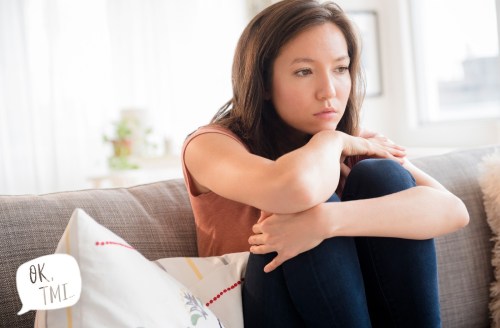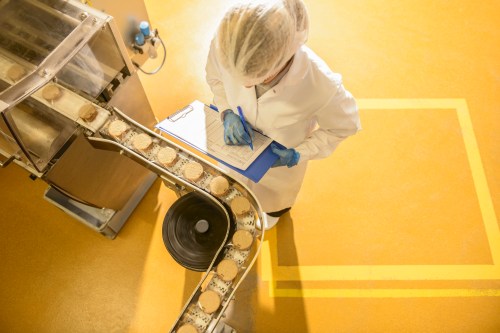I’m just going to come right out and say it: I have hemorrhoids. For the uninitiated, they’re “swollen and inflamed veins around the anus or in the rectum,” says Anita E. Spiess, MD, a gastroenterologist and representative of the American Society of Gastrointestinal Endoscopy. Jealous much?
Growing up, I was told to keep the poop talk to a minimum. (Except for when my dad would loudly ask, “How’s your diarrhea going, Al?” in front of whichever boy I liked at the time. Thanks, Dad!) But this silence around all things related to BMs has made it really hard for me to talk about my hemorrhoids to anyone, even doctors.
This might seem silly, but considering I have irritable bowel syndrome (IBS), they’re a recurrent part of my life. (Some people who have IBS frequently experience hemorrhoids, too.) I’ve dealt with the pain and itchiness they cause off and on for years, and until recently, it was a reality that I was too embarrassed to discuss with anyone. It’s why I was beyond relieved when my best friend of 10 years and I finally dished on all of our poop issues—including, yes, the fact that we both have hemorrhoids.
Before the eye-opening convo with my bestie, I’d always thought, “Oh this is something weird only happening to me, so I’m not going to tell anyone.” But as many as three in four adults will have a hemorrhoid during their lifetime, according to the Mayo Clinic. There’s no reason for it to be embarrassing.
So to really open this conversation and to feel comfy with our hems (yeah, I gave them a nickname), here’s what experts say you should know about where these bad boys come from, why they’re even a thing, and how to make sure you don’t pull another Groundhog Day anytime soon.
What are hemorrhoids?
Again, hemorrhoids are basically angry swollen veins around your anus or rectum. But Daniel Motola, MD, the assistant professor of medicine in gastroenterology at NYU Langone Medical Center, says there are actually two different types—internal hemorrhoids and external hemorrhoids.
External hemorrhoids are underneath the skin around your anus (so, on the outside of your butt). “When external hemorrhoids enlarge they are very painful due to the somatic nerves in the area,” says Dr. Motola. They can often form a large, painful bump. Internal hemorrhoids are inside your rectum, and Dr. Motola says while they aren’t usually painful, they can cause rectal bleeding.
If you deal with that icky itchy feeling while tending to a hemorrhoid, you’re not alone. “When the skin around the anus comes in contact with mucous or feces, then a patient can have itching and irritation,” adds Dr. Motola. So. Fun.
Why do people get hemorrhoids?
There are a couple of things at play, says Dr. Spiess, including chronic constipation or diarrhea and ahem, pushing too hard during BMs. Hemorrhoids in women often happen during pregnancy because of the increased pressure on the pelvic region. Other causes, she says, include sitting for long periods of time and not eating enough fiber. They’re also more common as people get older, according to the Mayo Clinic, because the tissues that support these veins stretch and weaken—making the area more sensitive.
For those of us who have IBS, there’s a reason why you feel like you have hemorrhoids all the damn time. “Changes in connective tissue in the rectum or increased pressure in the rectum due to hard stools or frequent stools leads leads to swelling of internal hemorrhoids,” says Dr. Motola. Given that going to the bathroom all the time is a hallmark of IBS…well, it’s all starting to make sense for me now.
How do I make them less awful in the moment?
First things first: You definitely should be see a doctor if you have a hemorrhoid, especially if you’re seeing blood in your stool. They’ll want to do an exam to rule out anything more serious, since blood in the stool can also be a sign of other conditions like colitis or rectal cancer.
Once they’ve established that yes, you have a hemorrhoid, dealing with one depends on what kind you have. For external hemorrhoids, Dr. Motola suggests warm water baths and topical pain relievers. “I typically recommend topical lidocaine [like Aspercreme] three to four times per day, Motrin or ibuprofen every eight hours, and warm sitz baths twice a day,” he says. (Sitz bath = sitting in a tub with a few inches of warm water in it to help clean and soothe the anal area.)
For internal hemorrhoids, your best bet is a gentle sitz bath since they can help increase blood flow and relax the area to help reduce pressure in the area, says Dr. Motola. He adds that over-the-counter remedies like steroid creams help with the itching or pain but don’t do that much else.
Either way, the pain and swelling should go down within a week. If you have a hard lump, that should go away within a few weeks. If things don’t clear up or get worse, you should go back to your doctor for a follow-up.
How can I prevent hemorrhoids in the future?
Both Dr. Spiess and Dr. Motola advocate for adding fiber-rich foods into your diet (think beans and lentils) and drinking plenty of water every day. Both of these measures will help ensure stools are softer and easier to pass, which equals fewer hemorrhoids for you. Dr. Motola also suggests adding a fiber supplement like Citrucel or Fibercon into your everyday routine, which he says can help keep things moving. (Just be sure to talk to your doctor first.) Dr. Spiess also recommends exercising to prevent constipation and also avoiding any straining when pooping.
To reiterate: Hemorrhoids are super uncomfortable, but they’re not at all uncommon. Lots of people have them, including me. So don’t be embarrassed the next time you accidentally lock eyes with someone at the drugstore while reaching for the Preparation H. They might be itching to talk to someone about it too.
Here’s what your poop is trying to tell you about your health. And speaking of TMIs, here’s what to do if you ever have a stuck tampon.
Sign Up for Our Daily Newsletter
Get all the latest in wellness, trends, food, fitness, beauty, and more delivered right to your inbox.
Got it, you've been added to our email list.










